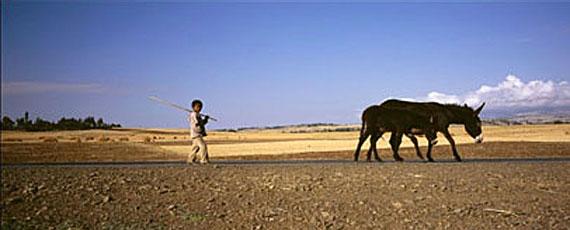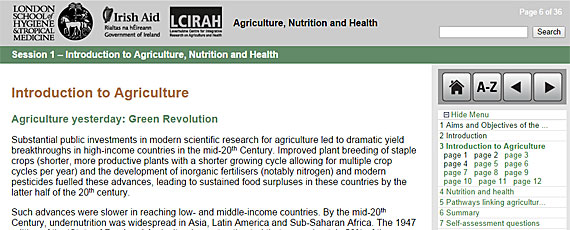Free Online Educational Course: Agriculture, Nutrition and Health

Main photo: A small boy herds two of his family's donkeys through the plains of Ethiopia. Source: Courtesy of Gates Foundation
A new free online course is now available to help government advisors and practitioners understand the links between agriculture, nutrition and health
Agriculture is a supplier of food and nutrients, a source of household income, and an engine of national economic growth. Through these many pathways, agriculture is intimately linked to food security, nutrition and population health. The course has been produced as part of the Irish government’s commitment to support capacity building in agriculture, nutrition and health. Irish Aid has partnered with LANSA researchers based at the Leverhulme Centre for Integrative Research on Agriculture and Health (LCIRAH) and the London School of Hygiene & Tropical Medicine to develop a free online module that presents the latest research evidence on the links between agriculture, nutrition and health. The module is designed to support government advisors, development organisations, researchers and others to understand the complex interplay between agriculture nutrition and health and to be up-to-date with the latest research evidence.
Agriculture has kept pace with population growth but undernutrition remains widespread
The 2013 State of Food and Agriculture report by the United Nations Food and Agriculture Organisation suggests that the agricultural and food systems must now play an increased role in promoting more nutritious and sustainable diets for populations all over the world. However, while global food production has been successful in keeping pace with population growth, food insecurity and undernutrition remain widespread. Similarly, excess dietary consumption is leading to global epidemics of overweight, obesity and chronic disease resulting in rapidly rising burdens of disability and death affecting all world regions.
About the module
This new module aims to bring together research and development professionals across the agriculture, nutrition and health sectors and to more fully integrate their practices, interventions and policies. This module contains nine sessions that explore the multi-sectoral links between agriculture, nutrition and health and consider how these interactions might be used to promote pro-poor agricultural development, reduce food and nutrition insecurity and improve the health of the poor.

The opening session ‘Introduction to Agriculture, Nutrition and Health’ covers core material that is essential to the successful completion of other sessions. The remaining eight sessions focus on agriculture, nutrition and health as it relates to economic development, gender, dietary diversity and the environment.
The full list of sessions is:
· Session 1: Introduction to agriculture, nutrition and health
· Session 2: Research methods and metrics
· Session 3: Agricultural development, economic growth, and nutrition
· Session 4: The role of gender
· Session 5: Improving nutrition through agricultural diversification
· Session 6: Providing nutrition through markets
· Session 7: Reducing risks of agriculture-associated disease
· Session 8: Interactions between environment, agriculture and health
· Session 9: Enabling environments for agriculture, nutrition and health
The full module is free to download for study from the LSHTM website as an Open Educational Resource. These are self-study sessions and that no tutorial support or certification is provided.
For further information or to leave comments about the module please email: agriculture-health@lshtm.ac.uk









Add new comment